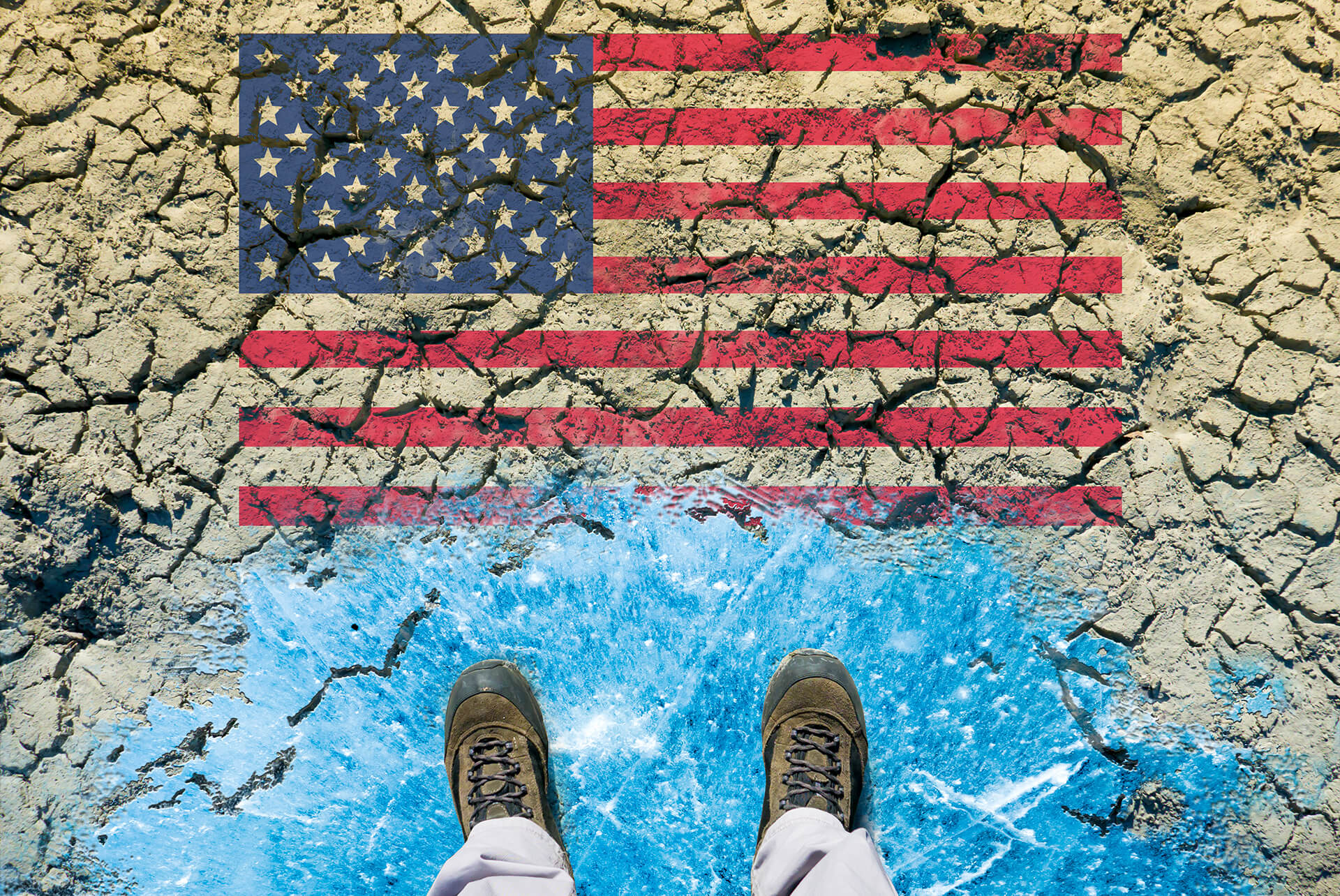It is hard for me to figure out the whole climate change challenge. For starters, I am a lawyer, not a scientist. For another, I actually prefer hot weather to cold weather. But something seems to be going on around us that is changing our surroundings much more quickly than the previously-perceived glacial pace.
Before we get to what should be done to address the problem, it would be useful to understand the problem in scientific detail. But I don’t. What I see and hear is alarming to say the least. It is alarming at a very personal level, but also at an existential level. On a personal level, I want to spend what time I have left exploring the outdoors, enjoying some of the wonderful places I have been before and finding a few new ones along the way. I want to catch more fish. I want to be able to hike, bike and kayak without fear of heat stroke or hypothermia. I want my 26-year-old son to continue his life on a planet that still brings joy and wonder.
It seems, however, that what I want won’t matter if the planet continues its demise. Just watching the wildfires consume once verdant landscapes and seeing lakes and rivers shrivel to dryness should be sufficient notice to know that something is very wrong with our globe. And it is not just one bad season.
Climate does not affect politics
Part of the problem in the US is that climate-related disasters like the latest deadly flood in Kentucky or the debilitating heat wave in Texas don’t seem to have any impact on the political morass in those states and others like them. Nothing seems to unleash voter outrage at the climate change deniers who continue to get voter support and who themselves are supported by some of the most corrupt corporate interests in America.
While there can be some political backlash immediately after a climate disaster, the type of sustained commitment required to prevent future disasters often wanes as soon as the relief funds begin to flow or attention moves on to the next disaster. I simply don’t understand this. Watching someone else’s outdated earthen dam burst should result in a critical analysis of the vulnerability of every earthen dam, but it doesn’t. Not even after it happens again somewhere else.
It is akin to Black voters who continue to vote for Republican candidates and Latinos who somehow think that treating their immigrant brethren like so much human waste is a plus. Abraham Lincoln was the last Republican to do anything for Black people, yet some Black people never learn. Some Latinos are so wounded by a sense of generational deprivation that ignoring the immigrant struggles of today seems to add a measure of contrived self-worth for those who have found a path denied to so many.
Through all of these political thickets and surely with regard to climate change, I think that I will be OK. I am old and White and privileged and don’t live near a regularly flooding creek or a drought ravaged forest. There seems to be plenty of drinking water around, and the supermarkets are full of produce from somewhere. It seems a little warmer these days, but it is summertime and the air conditioning continues to work. So, why do I care?
I am not sure why I care about climate change, but I do. Unfortunately, it seems that not enough of us care to demand something much better, like a comprehensive science-based program and the implementation plan and budget required to stem the destruction and begin to reverse the damage. To its credit, the Biden administration is trying to move the country in the right direction, and just-passed Democratic legislation provides some of the resources necessary to meet environmental commitments.
This legislation is a reminder of what can be done when resistance is aggressively shoved aside. It is also a reminder that the entire Republican congressional cohort continues to sell toxic snake oil to future generations. There continues to be way too much political, social and economic resistance to changing the climate about climate change. There is no excuse for this resistance and no excuse for the willful ignorance that drives so much of the resistance.
To get beyond the resistance and move toward a cohesive environmental policy aimed squarely at reducing global warming and the impact of climate change, there must be a coalescence of two critical concepts – community conscience and good governance. Without both, I fear that the efforts made will fall far short of the goals associated with slowing and reversing climate change.
Yet, in America, as in much of the rest of the industrialized world, neither a community conscience nor good governance prevails. Nowhere should the absence of the collective will and the institutional framework required to meet the climate challenge be more obvious than in America. As one of the world’s premier polluters by any reasonable measure and with the resources required to do so much better, America’s national failure to aggressively confront climate change looms large on the world stage.
Climate is sacrificed at altar of convenience
On this front, the real enemy is inconvenience. It is America’s antidote to caring. Americans can wallow in outrage with the best of them, but as soon as it becomes inconvenient to do so, the outrage gives way to beer, bourbon, and beaches. The American attention span is so short because the national intolerance for inconvenience so readily diverts attention.
This is particularly apparent with respect to climate change – turning up your summer thermostat for a day or two just won’t get the job done. Meanwhile, corporate greed ensures that any steps will be small and will protect profits instead of people. On the American right, inconvenience rises to the gospel, and truth is hard to find. On the American left, we love a good protest, but can’t seem to block any bridges or boycott any retailers long enough to make a difference.
Even if inconvenience doesn’t immediately overwhelm outrage, intermittent outrage and then back to the barbecue is almost worse than no outrage at all, because it creates the illusion of caring without any commitment to continue caring. Once a society stops caring about those in the community at large, it will always fail to explore the pathways to positive collective outcomes.
A large part of the remedy is community conscience. It is a simple concept – think enough about those around you that the decisions you make reflect something larger than yourself. Know a little about who is struggling in your orbit and find a way to help. That family a couple of streets over really does need the snow plowed on their street before yours gets plowed because their 13-year-old child needs to get to the kidney dialysis center. You and your street can wait. When you understand that plowing their street is more important than plowing yours, you are on your way to community conscience.
Good governance is likewise a simple concept – it is centered on the notion that human beings require some organized way to acquire community assets and then direct community assets to meet community needs. The emphasis here is on the “organized” part of the equation. If you understand why some schools are better than others, then you likely understand good governance. You understand the positive impact of sufficient human and financial resources organized in a way to promote the goal of good education, backed by policies and practices that have been proven to work.
To meet societal challenges, community conscience provides the fuel for good governance and the oversight required to protect good governance from those who would corrupt it. Think about this as the next wildfire burns something once beautiful to behold. Then, join the struggle to figure out the challenges that climate change presents and provide the spark that ignites a meaningful response somewhere.
*[This article was first published on the author’s blog, Hard Left Turn.]
The views expressed in this article are the author’s own and do not necessarily reflect Fair Observer’s editorial policy.
Support Fair Observer
We rely on your support for our independence, diversity and quality.
For more than 10 years, Fair Observer has been free, fair and independent. No billionaire owns us, no advertisers control us. We are a reader-supported nonprofit. Unlike many other publications, we keep our content free for readers regardless of where they live or whether they can afford to pay. We have no paywalls and no ads.
In the post-truth era of fake news, echo chambers and filter bubbles, we publish a plurality of perspectives from around the world. Anyone can publish with us, but everyone goes through a rigorous editorial process. So, you get fact-checked, well-reasoned content instead of noise.
We publish 2,500+ voices from 90+ countries. We also conduct education and training programs
on subjects ranging from digital media and journalism to writing and critical thinking. This
doesn’t come cheap. Servers, editors, trainers and web developers cost
money.
Please consider supporting us on a regular basis as a recurring donor or a
sustaining member.
Will you support FO’s journalism?
We rely on your support for our independence, diversity and quality.







Comment